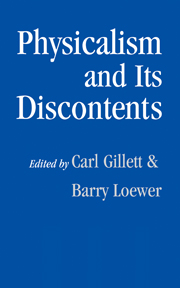Book contents
- Frontmatter
- Contents
- Contributors
- Preface
- Part I Physicalism
- 1 The Rise of Physicalism
- 2 From Physics to Physicalism
- 3 Sufficiency Claims and Physicalism: A Formulation
- 4 Realization and Mental Causation
- 5 Physicalism and Psychology: A Plea for a Substantive Philosophy of Mind
- 6 Davidson and Nonreductive Materialism: A Tale of Two Cultures
- 7 Substance Physicalism
- 8 Possibility: Physical and Metaphysical
- Part II Physicalist Discontents
- Part III Physicalism and Consciousness: A Continuing Dialectic
- References
- Index
1 - The Rise of Physicalism
Published online by Cambridge University Press: 02 November 2009
- Frontmatter
- Contents
- Contributors
- Preface
- Part I Physicalism
- 1 The Rise of Physicalism
- 2 From Physics to Physicalism
- 3 Sufficiency Claims and Physicalism: A Formulation
- 4 Realization and Mental Causation
- 5 Physicalism and Psychology: A Plea for a Substantive Philosophy of Mind
- 6 Davidson and Nonreductive Materialism: A Tale of Two Cultures
- 7 Substance Physicalism
- 8 Possibility: Physical and Metaphysical
- Part II Physicalist Discontents
- Part III Physicalism and Consciousness: A Continuing Dialectic
- References
- Index
Summary
No one could seriously, rationally suppose that the existence of antibiotics or electric lights or rockets to the moon disproves … mind-body dualism.
Stephen R.L. Clark (1996)Introduction
In this chapter I want to discuss the way in which physical science has come to claim a particular kind of hegemony over other subjects in the second half of this century. This claim to hegemony is generally known by the name of physicalism. In this chapter I shall try to understand why this doctrine has come to prominence in recent decades. By placing this doctrine in a historical context, we will be better able to appreciate its strengths and weaknesses.
As a preliminary, note that contemporary physicalism is an ontological rather than a methodological doctrine. It claims that everything is physically constituted, not that everything should be studied by the methods used in physical science. This emphasis on ontology rather than methodology marks a striking contrast with the ‘unity of science’ doctrines prevalent among logical positivists in the first half of the century. The logical positivists were much exercised by the question of whether the different branches of science, from physics to psychology, should all use the same method of controlled observation and systematic generalization. They paid little or no attention to the question of whether everything is made of the same physical stuff.
By contrast, physicalism, as it is understood today, has no direct methodological implications. Some physicalists uphold the view that all sciences should use the “positivist” methods of observation and generalization.
- Type
- Chapter
- Information
- Physicalism and its Discontents , pp. 3 - 36Publisher: Cambridge University PressPrint publication year: 2001
- 119
- Cited by



